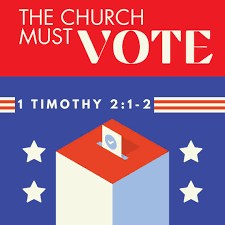
Brief post here, but I want to express something that I’m increasingly realizing about society and myself as a Christian and that is, how it’s important to have clear guidelines about what Scripture says and what it does not say.
Recently, I’ve seen Christian social media posts and videos where the post passes off a relatively good activity as some sort of biblically-mandated activity. One example is found in this post:

Voting is one of the great features of American society and a hallmark of freedom. I think it’s wise, good practice, and helpful for each Christian American to exercise his or her right to vote. Yet wise, good, and helpful are not the same thing as biblical. The above picture includes the text of 1 Tim. 2:1-2, which reads:
“First of all, then, I urge that supplications, prayers, intercessions, and thanksgivings be made for all people, for kings and all who are in high positions, that we may lead a peaceful and quiet life, godly and dignified in every way.”
Nothing about that text mandates voting. Sure, voting is a great way to help ensure we “lead a peaceful and quiet life, godly and dignified in every way,” but the text doesn’t suggest voting or any other First Century civic activity. It instead calls for supplications, prayers, intercessions, and thanksgivings be made for all people.
That’s why I take issue with that post. It’s not because I’m seeking to be divisive or to not allow room for actions that aren’t expressly written in the Bible. To the contrary, I know many Christians—whom I’d call brother/sister— are well-intentioned when they share things like this, but is it ultimately helpful beyond the immediate purpose of the post? I think the answer is “No.” While it may help someone to cast their ballot, it won’t necessarily help their worldview, witness, and ability to rightly interpret Scripture.
In 1 Corinthians 4:6, Paul, while talking about his ministry, shared a truth that he believed both he and Apollos modeled. It reads (emphasis mine):
“I have applied all these things to myself and Apollos for your benefit, brothers, that you may learn by us not to go beyond what is written, that none of you may be puffed up in favor of one against another.”
Though Paul’s precise meaning here is somewhat uncertain, I submit—and various scholars and commentaries agree—that not going beyond what is written was likely a known saying among the brothers and sisters at Corinth and was meant to encourage adherence to the Scriptures and the words of Jesus juxtaposed with the opinions of men.1 Too often, and at times with noble intent, professing Christians go beyond what is written, they go beyond the Scriptures to make their point. They may mandate vegetarian diets, private Christian education, or local church dress code requirements like semi-formal attire or women not wearing pants—none of which are biblical mandates. 2
Christians need to have a level of biblical literacy and scriptural integrity. Passing off the opinion of man—however good—as though it is the word of God undermines our witness and fidelity to the inspired text. Let us all strive to be faithful and avoid going beyond what is written. We honor God most when we do so.

1. The KJV supplies the words “of men,” which suggests not thinking of or regarding men beyond what’s written. Other modern translations supply the verb “go,” which, like the KJV’s “of men,” is not in the Greek manuscript. I believe the latter is more likely and don’t believe that’s a flimsy interpretation. At the same time, it’s important to note that this text to “not go beyond what is written” has room for other interpretations.
2. Vegetarian diets can be a great dietary change for health purposes. Private Christian education can be a helpful way to raise children in the Lord, especially amidst an increasingly post-Christian society. Dress codes can be a good way to help instill modest attire. All of these have good purposes, but all of them are not expressly biblical.